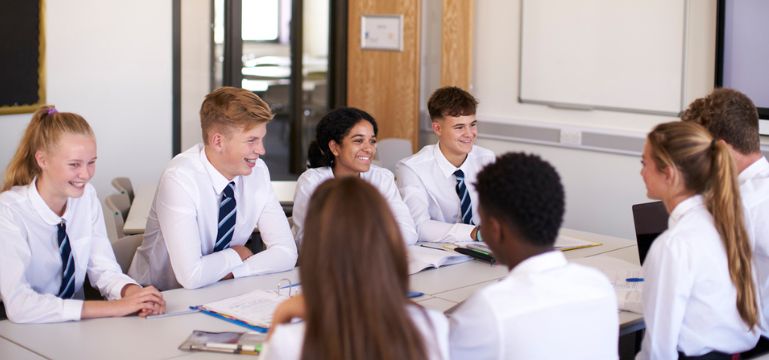Physical well-being, nutritional well-being and holistic wellbeing lessons

Quick links:
Information about the school
Ysgol Gyfun Gŵyr is a bilingual secondary school that is situated in Gowerton and serves a wide catchment area in the County of Swansea. There are 1,163 pupils on roll, including 168 in the sixth form. Seventy-two point five per cent (72.5%) of pupils come from non-Welsh-speaking homes and 7.8% are eligible for free school meals.
Context and background to the effective or innovative practice
Following inquiry and planning work, members of the Health and Well-being Area of Learning and Experience have worked together to ensure specialist provision for pupils which focuses on developing empathy, faith, commitment and positivity. They aim to support all pupils on their personal journey to achieve high levels of physical, emotional, intellectual and social health and well-being. Through rich and inclusive experiences, alongside the necessary knowledge and skills, all pupils are encouraged to live well and actively so that they can live happy and long lives and develop positive relationships and cope with life’s challenges.
Description of the nature of the strategy or activity
The aim of the Physical Health and Well-being lessons is to focus on developing and acquiring skills that develop a sense of pride in improving physical health, increasing fitness levels and fostering a sense of well-being. In the lessons, there are opportunities to measure and test fitness, learn about the different elements of fitness, develop an understanding of the importance of setting personal targets to improve fitness and provide opportunities to develop skills across a wide range of team activities, such as gymnastics, athletics and other sports. The ability to evaluate personal performance and the performance of others is also developed. During lessons, enterprising and creative contributors are developed and the Sports Teaching Model is used to provide role-play experiences in various activities. Attention is given to the importance of developing empathy when working with others; managing emotions when considering the needs of different members of the class and understanding the risks to the learners’ own lives and the lives of others. The opportunity to make connections with various sports and transfer skills from one activity to another is an integral part of lessons. Discipline and dealing with success and failure are also taught to provide an opportunity to develop self-awareness and a sense of achievement. Skills such as teamwork, tolerance and promoting mutual understanding and friendship are developed.
In the Holistic Health and Well-being lessons, the aim is to raise awareness of mental health and emotional, intellectual and social well-being, incorporating pupils’ awareness of resilience, responsibility and understanding to enrich their lives and the environment. In the lessons, working together by completing challenges, supporting others and showing empathy and being ready to learn are crucial. The Holisting Health and Well-being lessons follow the journey of life which covers concepts such as ‘The Web of Life’ and ‘The Journey of Life’. There is a focus on the importance of ‘cynefin’, or the local area, and learning about respect, empathy and kindness. Pupils are given an opportunity to create a first aid box to support emotional/mental health, learn about e-safety and the long-term effects of taking part in physical activities. In the Relationships and Sexuality Education lessons, pupils discuss body changes during puberty and about sex education and changes. There is a series of lessons on body image, learning about ‘Myself’. This information is used when dealing with real case studies, in addition to extending learners’ knowledge and understanding of hidden harm, drug use problems and eating disorders.
The Nutritional Health and Well-being lessons are a way of ensuring that pupils understand the importance of food and nutrition to promote lifelong healthy eating. Lessons provide guidance on food hygiene, making healthy foods, developing practical skills to prepare food safely and the importance of learning about ‘Food miles’. There is an opportunity to learn about special diets and, at particular times of the year, there is a focus on tasting seasonal foods. As in the Physical Health and Well-being lessons, practical work is placed at the heart of learning.
Through careful planning, lessons provide pupils with good knowledge and skills to measure the effect on their personal health. For example, in the Nutritional Health and Well-being lessons in Year 8, an understanding of different types of food is developed, including the macro-nutrients, micro-nutrients and energy that are found in them. At the same time, in the Holistic Health and Well-being lessons, the applied theory of body mass index measurements, the problems with obesity and associated diseases are introduced and then, in the Physical Health and Well-being lessons, guidance is given on how to keep the body healthy to maintain a healthy weight and the physical skills necessary to do this are developed and setting personal fitness targets is discussed.
What impact has this work had on provision and learners’ standards?
By listening to the pupils’ voice and analysing questionnaires, teacher adapt units of work regularly and tailor provision, keeping a finger on the pulse in terms of pupils’ aspirations. The obvious effect of this is that most pupils have healthier attitudes to learning as they develop self-confidence and selfworth. The Gŵyr Pupils’ Health and Well-being website includes a great deal of further information to enrich their learning outside formal lessons. The lessons have contributed to an improvement in pupils’ levels of resilience, self-control and academic performance to deal with the world’s challenges, whether on an individual level or as responsible members of society.
How have you shared your good practice?
There is robust co-operation between the members of the Health and Well-being Area of Learning and Experience at Ysgol Gyfun Gŵyr and members of this Area of Learning and Experience at ‘Cymuned Gŵyr’ level, which is the primary / secondary working group, as their plan jointly, identify learning and promote progress.